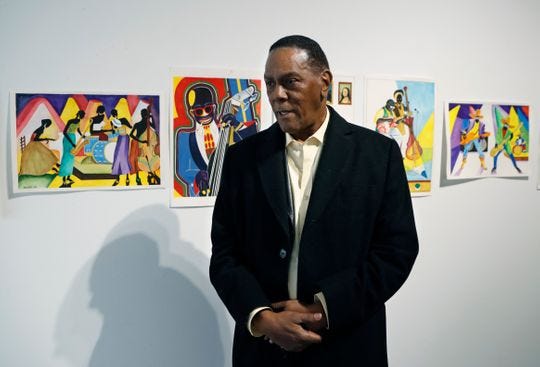Wrongfully convicted man learns he'll be paid for decades in prison

Detroit — A man who spent 46 years in prison for a murder he didn't commit learned Friday he'll soon be a millionaire, after the state Attorney General's Office agreed to compensate him for the years of freedom he lost.
Richard Phillips, 72, was released from prison in March, after being convicted in 1972 — making him the longest-serving wrongfully convicted prisoner in U.S. history, according to the Innocence Clinic at the University of Michigan.
Phillips will be paid $1.5 million from the Michigan Wrongful Imprisonment Compensation Act funds. The law, passed in 2016, dictates that exonerated ex-inmates be paid $50,000 for each year spent in prison. The award was announced by Michigan Attorney General Dana Nessel, who also approved $820,000 in payouts to two other exonerated ex-inmates.
"I just want to keep a low profile, travel and enjoy life," Phillips said Friday after hearing the news. "That’s what I wanted to do in the first place."
The awards still require an appropriation from the Legislature.
“I am absolutely thrilled with the new administration and the new attorney general," said Phillips' attorney, Gabi Silver. "They’ve taken a humanistic look at these cases, and from a legal standpoint, too. I think they’re finally interested in putting lives before politics.“
Wayne County Prosecutor Kym Worthy said she was pleased as well.
”This is great news, and was absolutely the right thing to do. I remain thankful that in 2018 we were able to bring some justice to Mr. Phillips," she said in a statement. "While this compensation will not bring back the 45 years that he unjustly served in prison, it is my sincere hope that it will bring a well-deserved and fulfilling quality of life to him."
Phillips was already facing an Oakland County armed robbery charge when he was charged with the 1972 murder. Although Phillips insists he was wrongfully convicted of that crime too, that case is pending, and thus he's not eligible to be paid for the 15 years he spent in prison for the armed robbery.
After Phillips' release from prison, he was in financial straits, and was forced to sell paintings he'd created while behind bars.
Several other ex-prisoners who were released from prison after wrongful convictions are still awaiting payment. The payouts aren't automatic; attorneys for the ex-inmates must file lawsuits with the Court of Claims, and the Attorney General's Office determines whether or not to fight the lawsuits.
Innocence advocates complained that former Attorney General Bill Schuette fought most of the payments. Kelly Rossman-McKinney, spokeswoman for Dana Nessel, told The News in February that Nessel was "working closely with her team to move forward as quickly as possible in evaluating these cases. However, she is deeply concerned about the level of funding available."
At the time, there was only $1.6 million in the fund. By early March, the fund had dwindled to $323,800, according to a House Fiscal Agency analysis.
In February, Rep. Steve Johnson, R-Wayland, introduced House Bill 4286, which would have allocated $10 million into the fund, although Gov. Gretchen Whitmer last week vetoed the bill.
Whitmer said in a statement her veto was because the funding was included within a policy bill instead of going through an appropriations bill.
The Whitmer administration wants to put $10 million for the wrongfully imprisoned fund into a current-year supplemental spending bill, Budget Director Chris Kolb said Thursday.
“There’s no issue on policy,” he said. “The real issue is appropriations should be made in appropriations bills.”
About $6.5 million has been appropriated to the compensation fund since its creation in 2016. The state faces payouts of up to $24 million for 39 pending wrongful imprisonment cases; 11 of those ex-prisoners are awaiting a change in the law that would expand the window in which they can file their claims. The 11 cases represent about $2.7 million of the $24 million total.
Phillips was convicted in October 1972, along with co-defendant Richard Palombo, for the murder of Gregory Harris. The conviction was based on testimony from the victim’s brother-in-law.
Seven years ago, Palombo told the parole board he and the brother-in-law killed Harris, and that he didn’t know Phillips at the time. The Innocence Clinic received a tip two years ago about Palombo’s statement and took up Phillips’ cause.
After the Innocence Clinic's involvement, Phillips' case was the first reviewed by the Wayne County Prosecutor's Office’s Conviction Integrity Unit, which investigates claims of wrongful conviction.
Since its inception in November 2017, the unit has gotten three exonerations, and seven new trials.
Phillips said Friday he has no immediate plans.
"I just want to chill, kick back, and paint," he said.
Jonathan Oosting contributed.